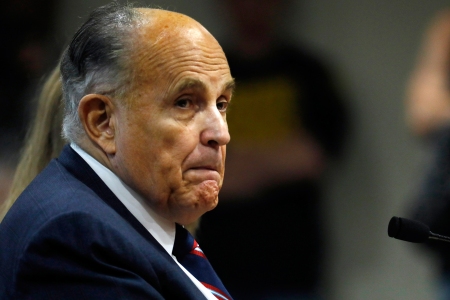Recently America commemorated the 20th anniversary of the attacks on September 11th, 2001. In the aftermath of those attacks, New York’s former mayor, Rudy Giuliani, rose to national renown. Given Giuliani’s recent return to prominence spearheading President Donald Trump’s campaign to overturn the results of the 2020 election, we should take a moment to consider the complicated legacy he created. Should we view him more as the 2001 symbol of democracy, or the 2021 attempt to undermine it?
Giuliani started his career in public life as a prosecutor and eventually culminated in his appointment as the U.S. Attorney for the Southern District of New York in 1983. While he was U.S. Attorney, Giuliani convicted thousands of criminals (including several notorious mafia bosses) and popularized the “perp walk” where suspects would be paraded before the media when in transit to court for arraignment. Giuliani used this background as a prolific prosecutor to run for New York City mayor in 1989 on a platform of decreasing crime and improving the quality of life. While he lost the 1989 election to David Dinkins, he promptly defeated him in the 1993 election and won re-election in 1997.
How did New Yorkers view his mayoralty leading up to 9/11? According to Queens College Political Science professor Alexander Reichl, the feelings were mixed. “Many New Yorkers credited Mayor Giuliani with restoring a sense of order to NYC by tackling crime and other quality-of-life concerns. But it’s easy to forget that in the closing years of his mayoralty Giuliani had fallen far out of favor with New Yorkers. As crime rates plummeted, Giuliani’s combative style and one-note, tough-on-crime persona seemed callous in the face of growing concerns over homelessness, gentrification, and inequality.”
9/11 was when everything changed. After the attacks, Giuliani made frequent appearances on TV and radio to assert control of the situation and was a visible presence at Ground Zero. He also famously proclaimed that “Tomorrow New York is going to be here. And we’re going to rebuild, and we’re going to be stronger than we were before … I want the people of New York to be an example to the rest of the country, and the rest of the world, that terrorism can’t stop us.” Giuliani won accolades for these actions, culminating in him being named Time Magazine Person of the Year, and earning the moniker, “America’s Mayor.”
To many, including Reichl, this transformation into “America’s Mayor,” especially when viewed in light of his actions a decade-and-a-half later is stunning. “Somehow 9/11 allowed Giuliani to pivot his harsh and confrontational style into an image of strength, resolve, and reason,” Reichl said, “From today’s vantage point it’s hard to imagine that Giuliani was the one seeking to calm tensions in NYC, standing by immigrants and rejecting hate against Muslims.”
In the years after 9/11, Giuliani staged a failed bid for the 2008 Republican presidential nomination after which he faded into the background, focusing on his law firm Giuliani Partners.
In 2016, Giuliani reemerged as an advisor to Donald Trump’s presidential campaign. After the election, Giuliani quickly became a key figure in the administration and joined President Trump’s legal team in 2018. Throughout Trump’s presidency, Giuliani was always involved in something controversial from the Mueller investigation, to the Ukraine scandal which led to President Trump’s first impeachment, and finally, being the central figure in President Trump’s effort to overturn the 2020 election and the subsequent invasion of the U.S. Capitol on January 6th, 2021.
In light of his long and complicated story, how are we to analyze understand the career of Rudy Giuliani? Reichl says, “I remember being in NYC during 9/11 and its aftermath, and I do think Giuliani deserves credit for his leadership during that terrible time. In the long arc of his career, however, I would say that his arrogance, opportunism, and relentless itch for a fight have too often undercut his potential as a statesman.” This is an apt description of Giuliani’s career. A man with the potential to become one of the country’s all-time great leaders, who indeed showed glimpses of greatness before the smoking ruins of the Twin Towers, but undercut by his own relentless quest for power and opportunity at whatever the cost.











